 HARARE, August 1;The lead opposition party in Zimbabwe described Wednesday’s election as “a huge farce” marred by serious administrative and legal violations and said it would not accept the much-anticipated results.
HARARE, August 1;The lead opposition party in Zimbabwe described Wednesday’s election as “a huge farce” marred by serious administrative and legal violations and said it would not accept the much-anticipated results.
“The shoddy manner in which it has been conducted and the consequent illegitimacy of the result will plunge this country into serious crisis,” said Morgan Tsvangirai, of the Movement for Democratic Change (MDC), who is running to end Robert Mugabe’s 33-year tenure as President of Zimbabwe.
The MDC’s claims were contradicted by the observer mission of the Electoral Commissions Forum of the Southern African Development Community (SADC-ECF) that commended the Zimbabwe Electoral Commission for overseeing a “peaceful credible and efficient electoral process”. In a press conference, SADC-ECF’s Notemba Tjipueja said that their team comprised of 25 observers largely confined to urban centres.
The tenor of Mr. Tsvangirai’s statement, and the SADC-ECF’s endorsement of the electoral process, suggest that MDC is contemplating the possibility of defeat. At the SADC-ECF press conference, government officials broke into applause when Ms. Tjipueja described the elections as free, fair and credible.
Mr. Tsvangirai has run against Mr. Mugabe’s ZANU (PF) for over a decade, including in the 2008 election in which he polled more votes that the incumbent but was forced to withdraw from the Presidential run-off when security forces attacked his supporters and killed over 200 people.
On Thursday, Mr. Tsvangirai described the election as “heavily manipulated” and directed a number of allegations against the Zimbabwe Electoral Commission, particularly regarding the preparation and authentication of the voters roll, the overprinting of ballot papers, and the bungled election for policemen and security services. He also accused the ZANU (PF) of bussing voters from the countryside into the city and using village headmen to intimidate voters.
In a separate report, the Zimbabwe Election Support Network (ZESN), a civil society organization that deployed over 7,000 observers across the country, claimed that close to 1 million urban voters had been disenfranchised in this election. The ZESN compared census data with voter registration data to indicate that 99.97 per cent of the eligible rural population had been registered to vote, while the corresponding number for urban areas was 68 per cent, and claimed that urban voters had been deliberately disenfranchised. Urban areas are known to be MDC strongholds.
Interviews with MDC supporters suggest that urban youth might have been ignored because the ZEC required prospective voters to provide proof of residence. Registration was open for a very narrow window of time, limiting the number of applicants.
“Young people in Harare don’t have houses so I had to get an affidavit from my landlord,” said Blessing Mynjoma, a 25-year-old MDC supporter who said he had to get an affidavit made three times, costing him almost $20 including transportation.
On voting day, the ZESN report continues, 82 per cent of urban polling stations turned 25 or more prospective voters for a variety of reasons, while the corresponding figure for rural areas was only 39 per cent. ZEC officials have suggested that the greater density of populations and polling stations in urban areas could have meant that some urban voters were not sure of the polling station where they were registered.
On Election Day in Murape, on the outskirts of Domboshawa village, election observers said about 1,200 voters had voted by 5:30 p.m., while 68 people had been turned away.
“Some were told they were registered at a different polling station, some were not on the rolls, some were aliens [non-citizens] and some had registered after the July 10 deadline,” said an MDC election agent at the booth, “One man was arrested for campaigned for the ZANU (PF) just outside the polling booth.” The ZANU (PF) observer seated next to her concurred with her assessment; both sought anonymity as observers are not authorised to speak to the press.
